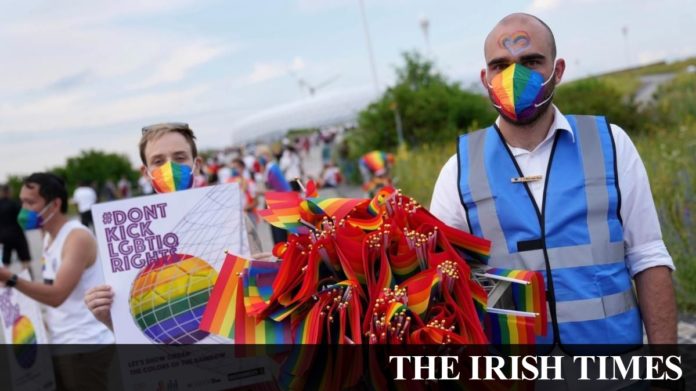“If you want to understand the Orban regime, it’s very important to note that, throughout his governance, and particularly in every election period, there is always one enemy,” says MEP Katalin Cseh on the phone from a taxi as she dashes between meetings in Brussels.
“It’s usually a group of people in a minority who are weak, who do not have the same opportunities as the majority and they are singled out. Before this it was the migrants. Now it appears that the LGBTI community is part of the new enemy group.”
Cseh is one of two young women who won seats in the European Parliament for Hungary’s newly-founded liberal, pro-EU Momentum party in 2019, a year of political upsets for the hard-right regime of Viktor Orban that saw the opposition advance in local elections and take the mayoralty of capital Budapest.
Now with national elections approaching in 2022, opinion polls indicate the united opposition is running neck and neck with Orban’s Fidesz party, and Cseh believes the government’s strategy is to stoke fears about gay people in a bid to shore up its political support.
This is the context to a a new law that bans the portrayal of gay people in any content that is deemed to be for people aged under 18.
Introduced as an amendment to a law on child abuse, the legislation has provoked uproar across western Europe where member states, already exasperated by Orban’s persistent vetoing of European Union statements on international human-rights issues, have rounded on Budapest for what they say is a deliberate move to rouse societal hostility towards LGBT minorities by equating homosexuality with paedophilia.
Ireland has called for the European Commission to take Hungary to court for violating EU norms, and joined 15 member states in condemning the law in a statement that revealed a stark divide between western and eastern Europe on the issue, as a cluster of states around Hungary chose to stay silent.
A showdown is expected as national leaders meet in Brussels this week and the row has even spilled over into the Euro 2020 soccer tournament, as local authorities around Europe declared they would display the rainbow flag in protest at Uefa’s refusal to allow Munich’s stadium to be lit up with the Pride colours for Wednesday night’s Germany-Hungary match.
“For the Hungarian LGBTI communities, it really gives hope to see so much international support in this difficult time,” Cseh says.
In 2020 Hungary was downgraded to no longer be rated as a democracy but rather a “hybrid regime” by the NGO Freedom House, which cited a raft of legal changes that allowed the Orban government to consolidate its control over the country’s independent institutions and suppress the freedom of the media.
EU cash
Orban’s ability to do this, according to Cseh, has been smoothed by EU cash, which she says he has used to enrich a coterie of cronies that in turn support Fidesz. She points to the case of Lorinc Meszaros, a school friend of Orban and a former gas fitter who was awarded a raft of state and EU-funded contracts and now ranks as Hungary’s richest man.
“It’s how Orban maintains his power,” Cseh says.
The MEP points to a laggardly response from other EU states and from the European Commission in the years when Orban began to take his authoritarian turn, and worries that inaction now could encourage his allies in other member states under populist rule.
“This enables I think, other people who feel that the free press is just a nuisance for their government, or believe that they could be better off with more loyal judges,” Cseh says. “This is why we have to be very, very strong in confirming that we are a community, we are not a cash machine.”
She has called on the commission to come down hard on Hungary through infringement procedures, which were initiated in 2018 along with proceedings against Poland for stacking the judiciary, but have stalled since. In addition, she wants the EU to use a new conditionality clause attached to funding, which is designed to withhold cash for countries that infringe the rule of law.
Orban’s strategy is to get what he can from the EU, while limiting the bloc’s power, Cseh believes.
“I think he wants to weaken the EU significantly. He wants to turn back to the idea of pure nation states, and limited economic co-operation between them,” Cseh says.
“I think what he doesn’t understand [is] that a weak EU is bad. Bad for everybody, but particularly for small countries with open economies such as Hungary. Hungary would never be able to influence anything in the global sphere if it wasn’t part of a community 450 million strong.”








